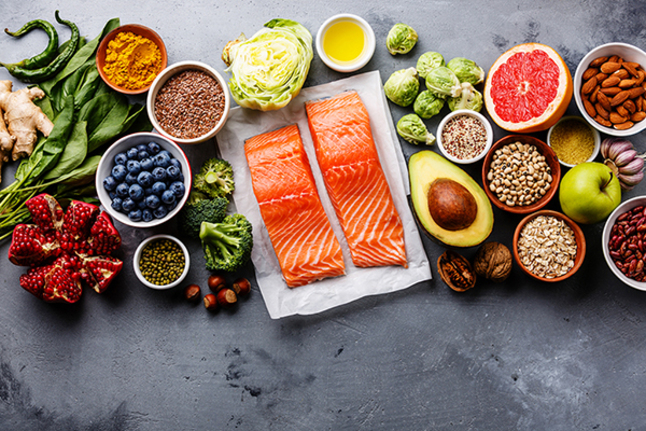- Get link
- X
- Other Apps
JUST IN
- Get link
- X
- Other Apps

1. Vitamin C – Citrus Fruits & Greens
Consuming foods high in vitamin C such as grapefruits, oranges, tangerines, sweet red pepper, broccoli, strawberries, kale, and kiwifruit are thought to increase white blood cell production, which is key to fighting infection.
2. Beta-Carotene – Root Vegetables & Greens
Beta-carotene converts into vitamin A, which is an anti-inflammatory vitamin that can help your antibodies respond to toxins, such as a virus. Carrots, spinach, kale, apricots, sweet potato, squash, and cantaloupe are all great sources of beta-carotene. Vitamin A is a fat-soluble vitamin, so consuming foods with healthy fats will aid in its absorption. A great immune-boosting combination would be carrots with traditional hummus or a spinach salad with avocado or olive oil in the dressing.
3. Vitamin E – Nuts, Seeds & Greens
Vitamin E is a fat-soluble vitamin that is key in regulating and supporting immune system function. Foods rich in vitamin E include nuts, seeds, avocado, and spinach.
4. Antioxidants – Green Tea
Green tea is packed with antioxidants that have been shown to enhance immune system function. It also contains amino acids that may aid in the production of germ-fighting compounds in your T-cells, which reduces inflammation in the body and helps fight infection. Green tea can be consumed hot, cold or as matcha powder.
5. Vitamin D – Sunshine, Fish & Eggs
Vitamin D is essential to immune function and helps regulate the body’s immune response. Vitamin D can be found in salmon, canned tuna, egg yolks, and mushrooms. Your body can also synthesize vitamin D with just 13-15 minutes of sunshine three times a week.
6. Probiotics, Gut Health & Immunity
Yogurt, Kombucha, Sauerkraut, Kimchi, Pickles, Tempeh (Fermented Soybeans), and certain types of cheese contain live cultures, also known as probiotics, which are thought to help stimulate the immune system to fight off disease. The microbiome or the “good bacteria” in your digestive system determine how other nutrients and harmful bacteria are processed in your body, making probiotics perhaps one of the most important functions for immunity. The microbiome helps you process the nutrients described throughout the rest of this article, while also acting as an extra barrier for fighting off harmful bacteria and fungi.
7. Garlic – T-Cell Booster
Garlic contains compounds that help the immune system fight germs in a variety of ways by stimulating cells important to fighting disease and helping to regulate the immune system. It helps boost the production of virus-fighting T-cells and can reduce the amount of stress hormones your body produces which can help keep your immune system functioning at full strength.
8. Vitamin B-6 – Lymphatic System Boost & Red Blood Cells
Vitamin B-6 is essential in the formation of new and healthy red blood cells, and aids in maintaining the lymphatic system. Chicken, turkey, cold-water fish (salmon and tuna), chickpeas (traditional hummus), bananas, fortified breakfast cereal, and nutritional yeast are great options for consuming vitamin B-6.
9. Water – Hydration & Immunity
Water helps produce lymph which carries white blood cells and other immune system cells through the body. There are many foods with high water content such as cucumbers, watermelon, and celery. If you have a hard time drinking plain water, try a cup of green tea with lemon, watermelon, cucumber or mint-infused water for an immune system powerhouse beverage. Think of proper hydration as a way to make it easier for immune-boosting nutrients to get to where they need to go (cells) in your body.
10. Zinc – Shellfish, Poultry, and Beans
Immune system cells need zinc to function as they are intended. Zinc is a mineral that our body does not store or produce. While oysters have the highest food content of zinc, there are several other options such as shellfish (crab, clams, lobster, and mussels), poultry (chicken or turkey), red meat and beans. Zinc is also found in fortified cereals and some breads, but the best absorption comes from animal-based foods.

Comments
Post a Comment
Let know your comments